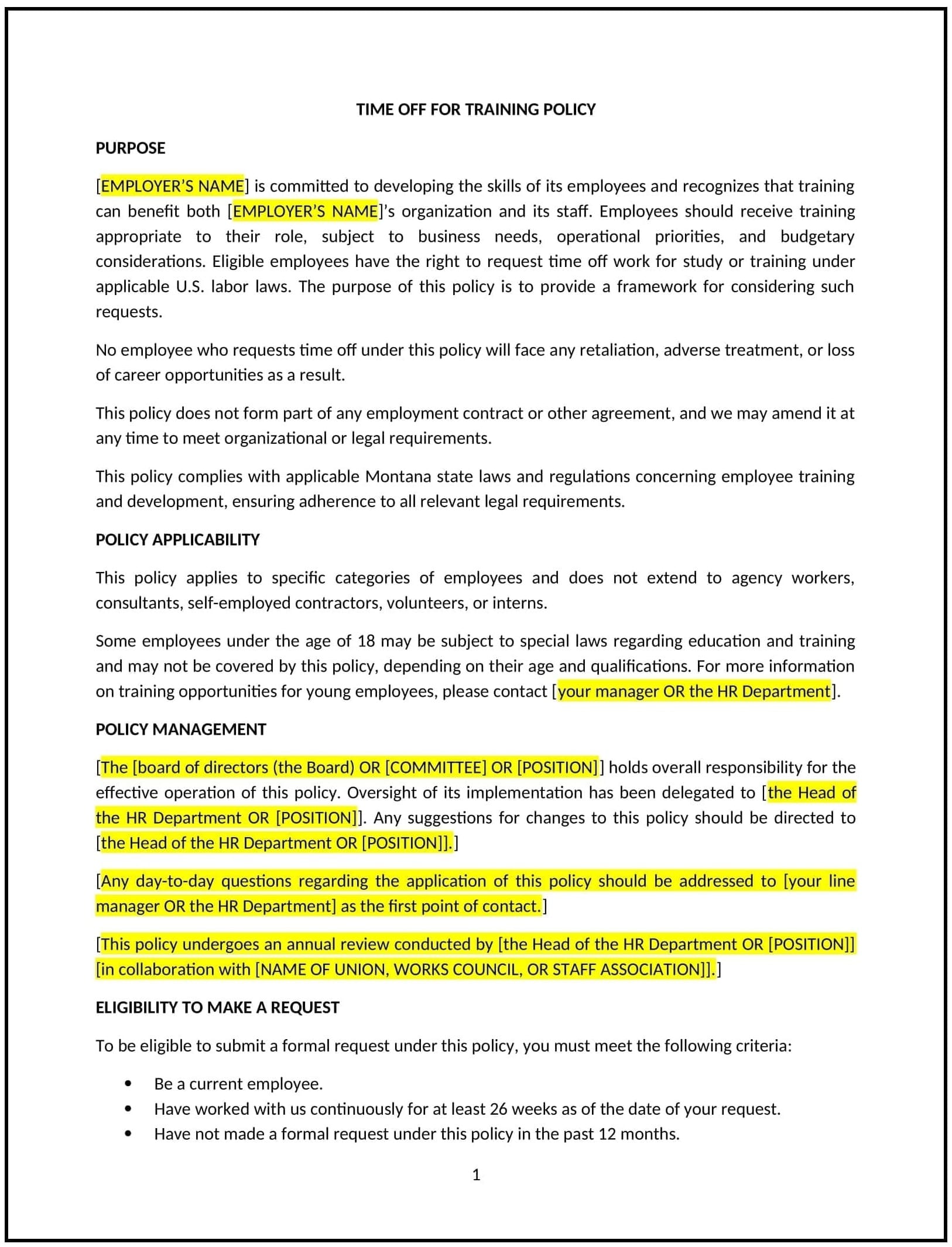Time off for training policy (Montana): Free template
Got contracts to review? While you're here for policies, let Cobrief make contract review effortless—start your free review now.

Customize this template for free
Time off for training policy (Montana)
A time off for training policy helps Montana businesses support the professional development of employees by providing time off for training programs, workshops, or educational courses that improve skills and knowledge related to the job. This policy outlines the procedures for requesting time off for training, eligibility criteria, and the company’s expectations for training outcomes.
By implementing this policy, businesses can enhance employee capabilities, improve job performance, and foster a culture of continuous learning and growth.
How to use this time off for training policy (Montana)
- Define eligible training opportunities: The policy should specify what types of training or professional development activities qualify for time off, such as job-related certifications, workshops, seminars, conferences, or formal education programs.
- Set guidelines for requesting time off: Employees should be instructed to request time off for training in advance, providing details about the training, dates, and any costs associated with it. The policy should outline the process for submitting and approving requests.
- Clarify eligibility requirements: The policy should define which employees are eligible for time off for training, such as full-time employees or those who have completed a certain length of service with the company.
- Outline approval process: The policy should specify the steps for approval, including who is responsible for reviewing and authorizing requests for time off, as well as any criteria that will be used to evaluate whether the training aligns with the company’s goals.
- Address compensation: The policy should clarify whether employees will be paid during their time off for training, and if so, how compensation will be determined. This may include paying for the cost of the training, covering travel expenses, or providing paid time off for training hours.
- Set expectations for post-training application: The policy should emphasize the expectation that employees will apply what they have learned from the training to their job performance. This can include providing feedback on the training or sharing new knowledge with the team.
- Review and update regularly: The policy should be reviewed periodically to ensure it remains relevant to the company’s goals, the evolving needs of employees, and changes in training opportunities or business requirements.
Benefits of using this time off for training policy (Montana)
This policy provides several key benefits for Montana businesses:
- Promotes employee development: By offering time off for training, businesses can help employees build new skills, improve their job performance, and prepare for future roles within the company.
- Increases employee engagement: Providing opportunities for professional growth enhances employee satisfaction, motivation, and retention, as employees feel valued and supported in their career development.
- Enhances business performance: Employees who receive relevant training are better equipped to contribute to the company’s goals, leading to improved productivity, efficiency, and overall business success.
- Supports succession planning: By investing in employee training, businesses can prepare employees for higher-level roles, supporting long-term succession planning and organizational growth.
- Reduces turnover: Offering time off for training shows employees that the company is invested in their personal and professional growth, helping to increase job satisfaction and reduce turnover.
- Improves competitiveness: Well-trained employees can help businesses stay competitive by adapting to industry trends, mastering new technologies, and improving processes within the organization.
Tips for using this time off for training policy (Montana)
- Communicate the policy clearly: Ensure that all employees are aware of the time off for training policy, how to request time off, and the types of training that qualify. This should be included in the employee handbook or company intranet.
- Align training with business needs: When approving training requests, ensure that the training aligns with the company’s strategic goals and the employee’s role to maximize the return on investment.
- Encourage employees to share learning: After completing training, employees should be encouraged to share their new knowledge with colleagues or apply it to their current projects, helping to spread the benefits of the training across the team.
- Track training and development progress: Keep records of the training programs employees have completed to monitor progress, identify gaps in skills, and plan for future training initiatives.
- Offer financial support for training: Consider covering the cost of training programs, such as registration fees, travel, or materials, to encourage employees to take advantage of professional development opportunities.
- Review the policy regularly: Periodically review and update the policy to ensure it meets the needs of both employees and the company, as well as to incorporate any new training opportunities or changes in the business environment.